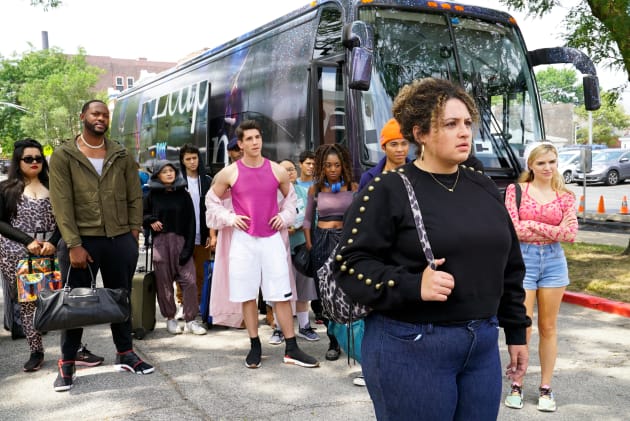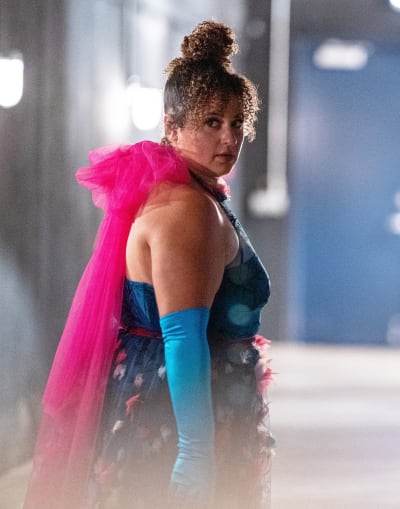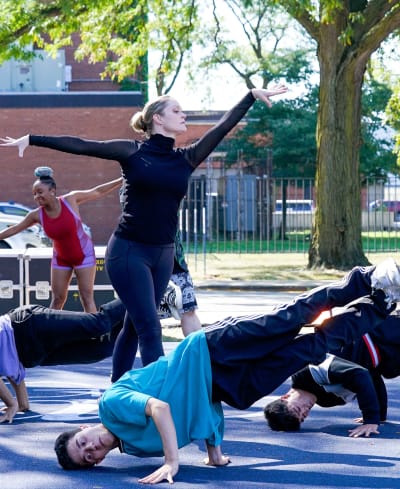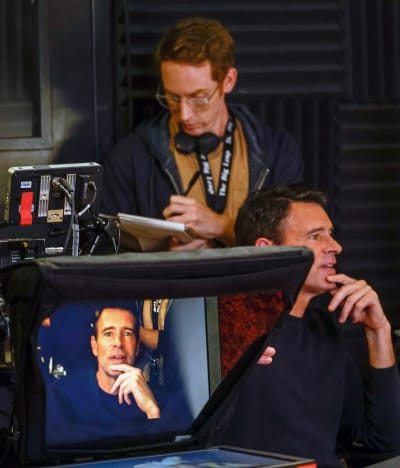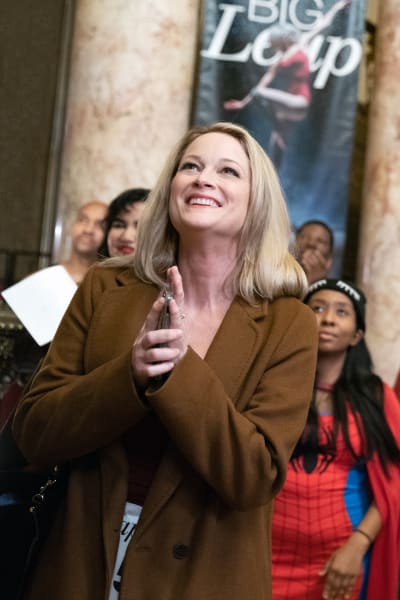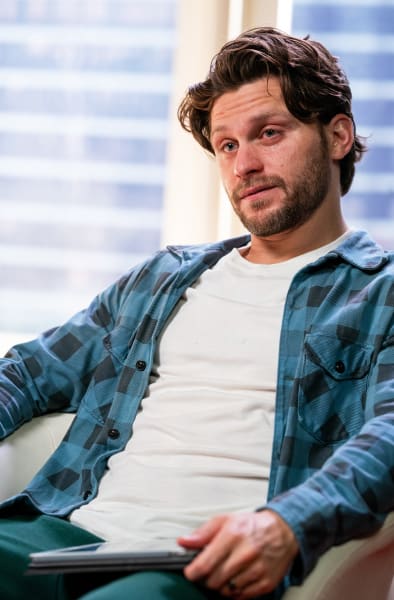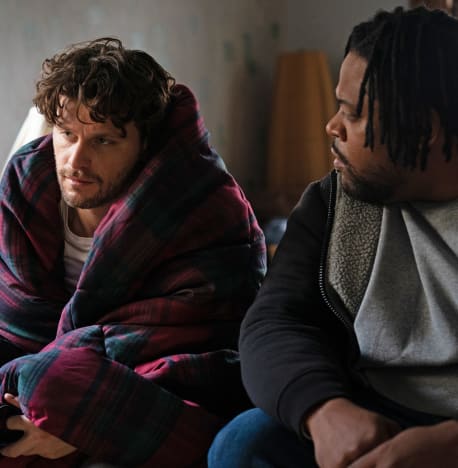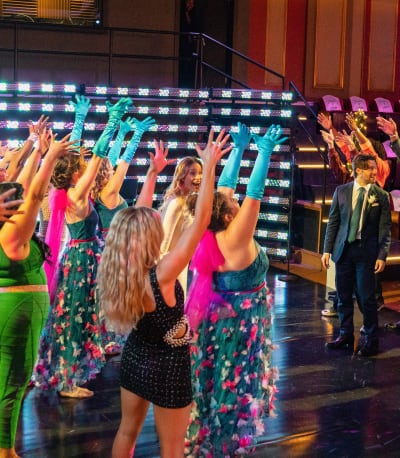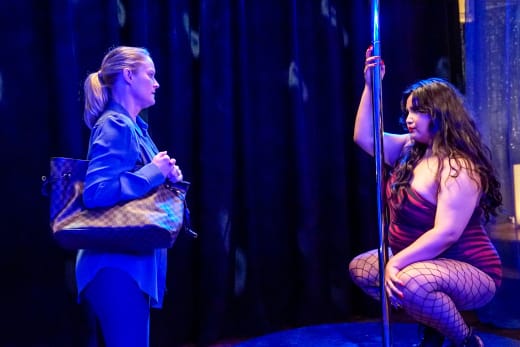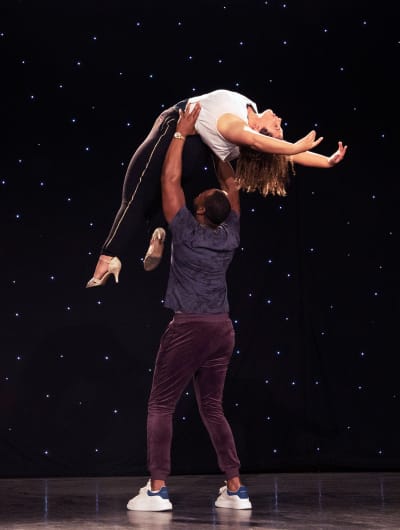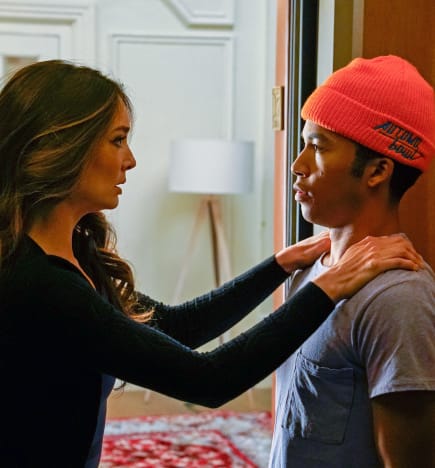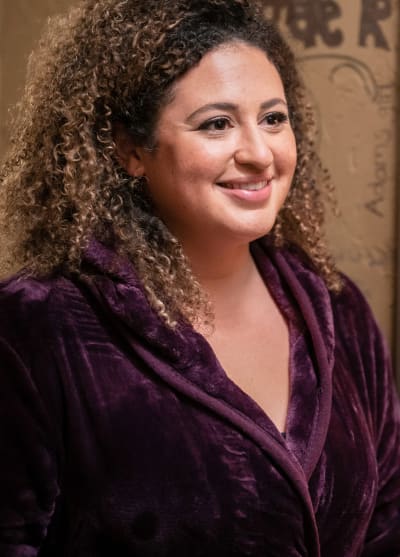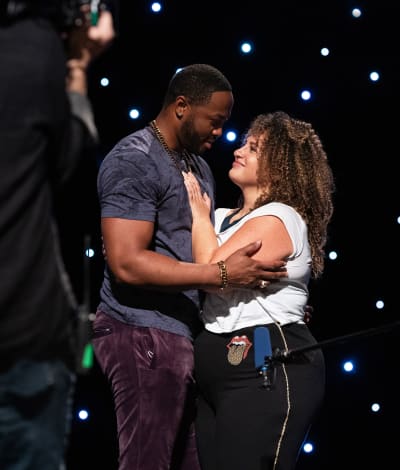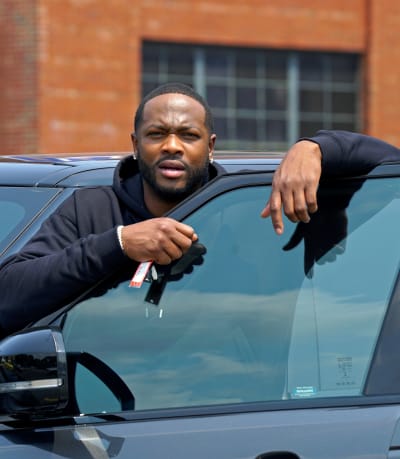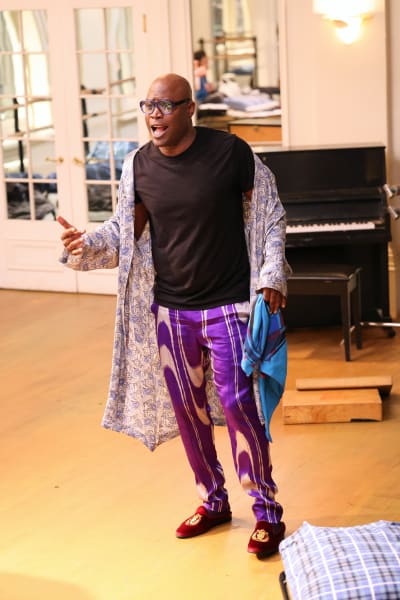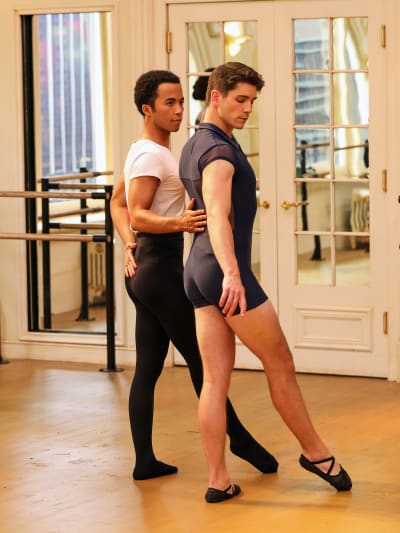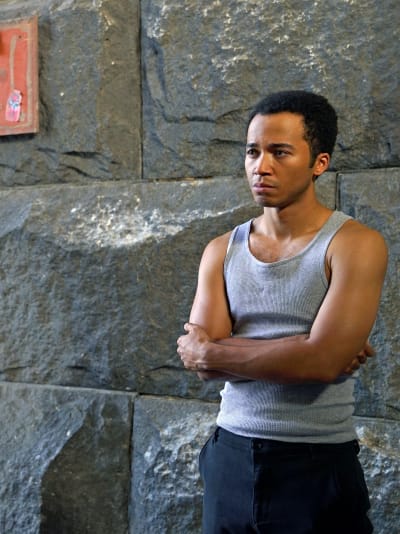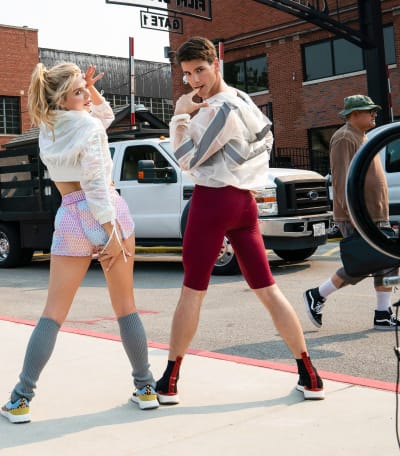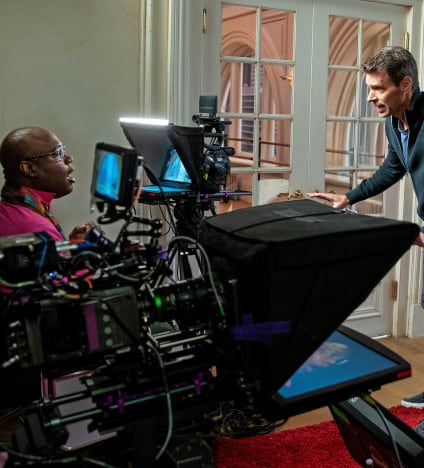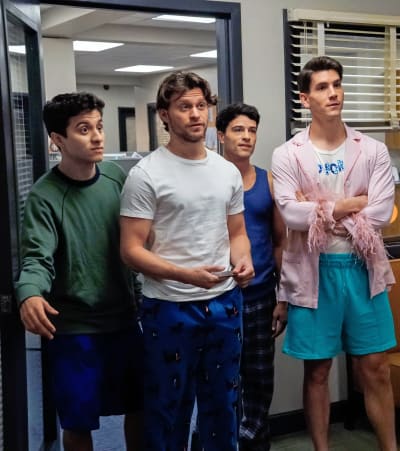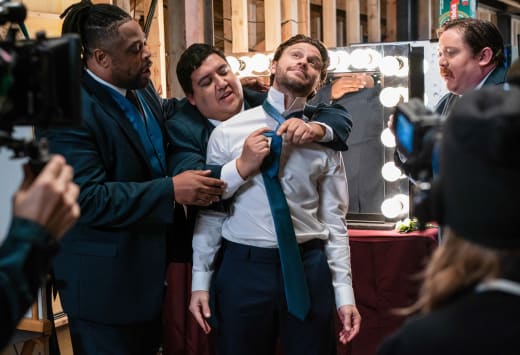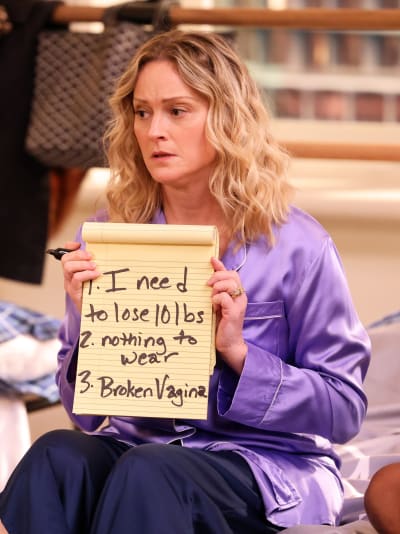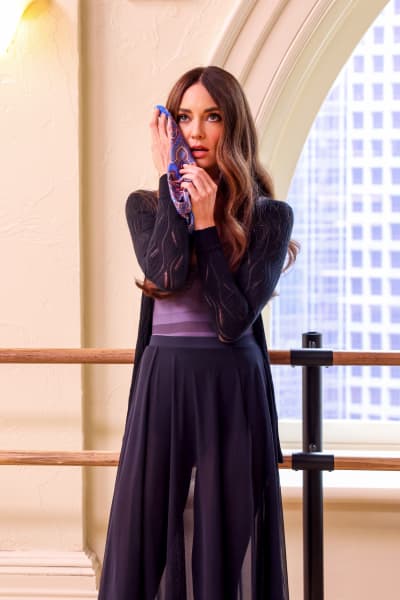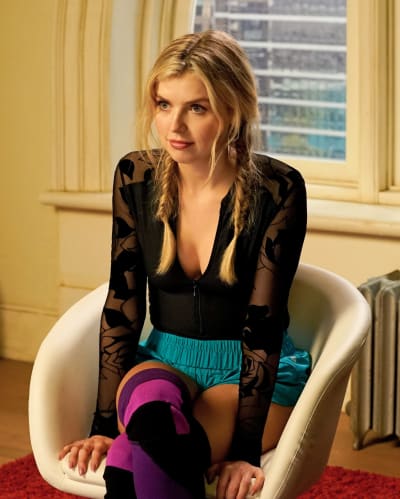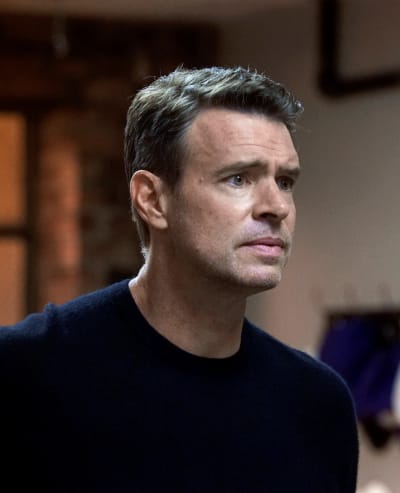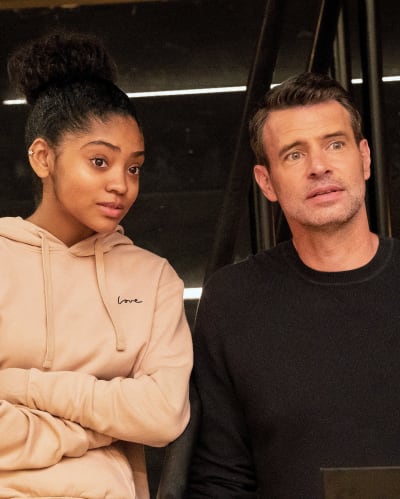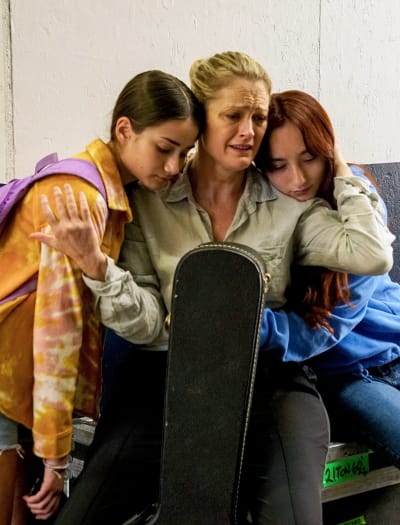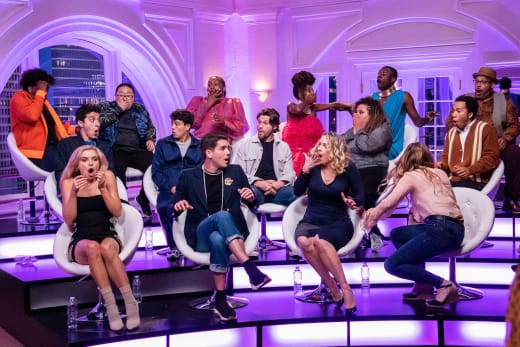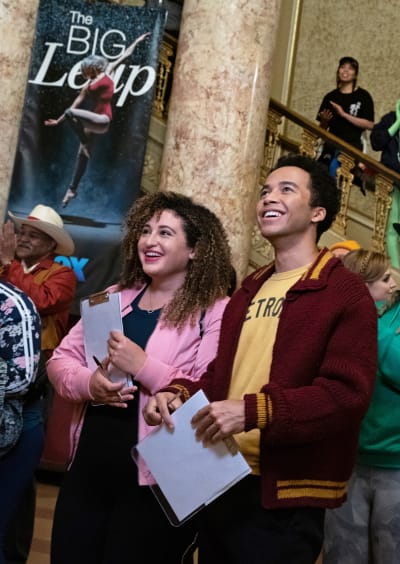Some people sleep on their sides, others on their back.
But a frustrating number have slept on The Big Leap, which is easily one of the cleverest breakout series on network TV.
No other series thus far has adequately captured the perfect, most resonant, and necessary (post) pandemic tone.
And whether it was always the show’s intention or they rose to the occasion, The Big Leap tapped into something absent from network TV and not for lack of trying.
It’s not this writer’s first foray into commending a series for providing a perfect blend of escapism, authenticity, humor, joy, and entertainment in a show that’s criminally underrated and deserving of more recognition.
I’m the same person who dared folks to appreciate the magic of the Jason Ritter-led Kevin (Probably) Saves the World and begged for a Pitch renewal.
I penned a piece questioning why networks and audiences are allergic to most escapist television — with the Scott Foley-led Whiskey Cavalier and poured her heart out scribing a love letter to Prodigal Son.
I’m also the person who has been nonstop gushing about the magic of The Big Leap in every review.
And that’s because The Big Leap is one of the most deceptively brilliant series people aren’t watching.
It’s not often you stumble upon a series with such a strong command of characterization, presence, and intention.
When those around the series failed to describe what the show was and intended to do, the show itself had a firm grasp on its direction and identity from The Big Leap Season 1 Episode 1.
The satirical edge of the series, exploring the mechanizations of reality TV with little effort, parlays into a heartfelt dramedy that hits emotional notes that can rival esteemed dramas.
With the pandemic, viewers desperately craved television that felt real and grounded and brought lightness and joy.
Our lives contain multitudes — both highs and lows blended in equal measure, with median points mixed in. A series can rarely expand and bring that to the screen with precision.
Most series couldn’t manage the transition between acknowledging the pandemic we endured and how it affected people while not dwelling in its dredges.
The Big Leap not only understood the assignment but scored an A+.
It broke through a barrier, becoming one of the first series to capture the balance of Post-Pandemic life.
The very concept of this series about a group of down on their luck misfits getting a second chance is as relatable as it gets for those of us still trying to find our footing in the world when everything that we’ve known has irrevocably changed.
They captured the dark humor of our reality and our present.
No character has excelled at this better than Jon Rudnitsky’s Mike. A character who, hand to heart, is the first in this new Post-Corona era of television that feels realistic and embodies where so many of us find ourselves as we emerge from these unprecedented times.
Truthfully, I could write 1000 more words about the complexities of Mike and even argue why the “disenfranchised white man” on a dance show is one of the greatest characters of all time without a hint of irony or hyperbole to be found.
As The Big Leap’s every man, he nailed what we could anticipate when he humorously shouted out that bats killed our grandparents.
Stop saying I got fired. It’s not accurate. The auto industry shipped my job to Mexico, and there was a global pandemic. From a bat! A bat killed all of our grandparents! How is that my fault?
Mike
As a man who keeps losing things, from facing unemployment after getting laid off from his factory job to juggling five different side gigs ranging from deliveries to ride shares, Mike embodies the average person who has faced a plethora of hardships and life-altering changes and is simply trying to get by.
And he faces them as a functional depressed person with dark humor as a coping mechanism and still has a big heart, light, and kindness that hadn’t been extinguished from him yet, even as he faces more challenges and heartache as the series continues.
The shrinking middle class, stagnancy in life in all ages and walks, and longing for connection, purpose, and hope permeates through the entire series.
It’s familiar, an emotional state that audiences can connect with after collectively experiencing something that causes us to reevaluate everything and leaves us longing for better connections with others and more out of life.
The series has woven all of this carefully and subtly throughout its plethora of storylines in ingenious ways. And that’s what makes this show so well-written in ways one can’t even begin to dissect and explain.
Even the supporting characters are well-rounded enough to capture this quality. In a blink and you miss it line, Tap dancer Tamra shares how trying out for this series was something she needed after her experience as an ER nurse during the height of the pandemic.
One seemingly throwaway line is packed with meaning and says a dozen things without going down a dark path.
Because The Big Leap carefully crafts and curates every line and zinger, hitting home points with purpose. Every word is intentional and counts, painting pictures and giving deeper insight without handholding the audience through it or undemanding viewers’ intelligence.
Two of the hip hop b-boys were paramedics, and dancing now is a respite from the dark days that befell them working in a city where they saw so much death.
A dazzling Raven proudly uses sex work to pay the bills while obtaining her certifications as a life coach, and there’s no shame in that.
Justin’s millennial malaise as he worked at a bowling alley and single mom Gabby experiencing the same at her desk job when their aspirations were far greater is relatable and compelling.
The Big Leap leans into tropes, manipulates them to their will, and produces quality content.
Their characters, on the surface, seem like caricatures. But the combination of the writing and acting results in rich, gripping characters as the series turns the expected cliche on its head in sly ways.
It’s masterful, really, something that is difficult for many series to execute, but The Big Leap does this with ease.
For a freshman series, The Big Leap understands characterization and development well. It has a seasoned approach to its characters that is half the journey in making this series a beloved one.
And it’s impressive what the series has done with its storytelling and character-building in such a short time.
The series rewarded viewers with a beautiful journey that, in hindsight, seemed impossible to pull off in 11 episodes or less.
Rarely do you have an ensemble cast filled with such a diverse group of characters and can pinpoint each one’s journey.
Not a single character in this full-cast fell by the wayside in this first season. It’s something viewers couldn’t fully appreciate until these last few installments as the season wraps up, and we can reflect on the gorgeous ride this series took us.
It’s the culmination of sharp writing and an excellent cast. There is a wonderful blend of seasoned veterans, fresh faces, and professional dancers.
Names like Scott Foley, Piper Perabo, Teri Polo, Kevin Daniels, and Jon Rudnitsky drew people in, and make no mistake, my God, have they all delivered.
But of course, a series about second chances is also about first shots and breakout roles. Frequently we note it, and that’s because it’s the gospel truth. Simone Recasner is a freaking star.
In the ideal world, we’d have her as our warm-hearted, talented, tenacious lead for seasons to come. But if that is not the case, it would be a disservice not to regularly have Simone Recasner on our screens.
The Big Leap embraces diversity and identity but authentically. They’re not checking boxes, and when they present the unique experiences of this myriad of people, they do so without boxing any of the characters in and reducing them to just what they represent.
Gabby has layers. While nodding at the beauty and importance of her leading role as a multiracial plus-sized woman, the series never reduces her to that alone.
Gabby is the “every woman.” And the show’s meta is in recognizing Recasner’s appeal, star, and endearing quality while Gabby held that same place in the reality show universe.
They trusted and knew that Recasner would steal our hearts, and she did.
And they conveyed everything we could’ve needed for Gabby as a character.
She’s a confident woman who gradually learns to hold her space in this world while unpacking and working through past trauma.
She was never the big girl with low self-esteem but rather a perfectly human woman who is subjected to bouts and moments of realistic insecurity not extensively rooted in fatphobic storytelling.
She finds love in a man who values her for what she is from the beginning without the story subjecting her to the cliched route of her changing and sacrificing herself, identity, and appearance to meet his bar.
If anything, Reggie has to meet hers. The show both understood the importance of Gabby finding love while also not losing herself in it. She has a remarkable journey blossoming into this beautiful, talented star throughout the season.
Gabby chooses herself and grows into understanding her value and worth, and that journey organically flows from the premiere until now.
Recasner and Ser’darius Blain’s instant chemistry made them one of the main attractions and, deservedly so, one of the hottest new It couples on a series that delivered four at once.
Blain infuses an effortless cool in Reggie, who at first glance comes across as a self-destructive lothario but is so much more than that.
The series turned the cocky womanizing jock trope on its head. Reggie’s flaws are far more profound and engaging, a character who clings to football as the one thing of which he’s excellent.
His identity is linked inextricably with the sport that he’s struggled to find himself outside of it.
The weight of taking care of those he loves is at odds with a sport that wreaked havoc on his body. They’ve barely scratched the surface of Reggie’s journey in that regard.
In a sense, similarly, Kevin Daniels’ wise, nurturing Wayne throws himself into holding and keeping others together because it keeps him whole and on the right path.
Greater insight into his past revealed another flawed character who felt like a stark contrast from the man we had come to know.
And the merit of Wayne’s story is in showing that even the caretakers and cheerleaders need uplifting and are human. Wayne finds strength in compassion and love, and it’s such a beautiful message and image.
He’s more than the wise, supportive role uplifting the characters around him, and the series presenting him as vulnerable shows how well they comprehend subverting problematic archetypes.
It translates to other topics like how they handle their other queer characters.
Raymond Cham Jr. is another breakout star as Justin and is easily in the running for one of the best character arcs of the season.
The series expertly unpacks intersectional aspects of his identity as a queer man of color, subtly touching on the different experiences and hangups he had to unpack compared to and while falling in love with Simon.
And never once does either his or Simon’s arc veer toward After School Special.
Instead, the audience follows Justin on his journey toward self-acceptance, standing in who and what he is and going after what he wants fearlessly.
And forever scene-stealer Adam Kaplan’s Simon helps Justin on his path while simultaneously navigating his own.
Simon’s self-destructive quality that sneaks up on the audience and inability to trust good things as trauma responses of a toxic childhood is enough to bring you to tears.
Through both men, namely Simon, the series boldly pirouetted into uncharted waters, addressing not only internalized homophobia but femmphobia calling to the carpet the combination of homophobia, sexism, and toxic masculinity that results in the unfavorable view of flamboyant men in touch with their femininity.
The series routinely and smartly dismantles the very practice of toxic masculinity with all of its characters in various forms.
One of this series’s most significant and subtly groundbreaking features is the rich, emotionally mature, healthy depiction of male bonds.
There’s ample space for hetero men to befriend and have healthy, platonic, affectionate, and loving relationships with queer men.
Scott Foley’s harbinger of chaos and mastermind of manipulation, Nick, develops something akin to a bromance with Wayne throughout the season.
They’re an oddball pairing that works and leads to some of the most comical exchanges this series has to offer.
And there are no boundaries in that relationship. The two meddle in their respective love lives, urging the best in one another and demanding only the best for each other.
Simon is free to be himself in their dance bubble where no one bats an eye at his flamboyancy, much like season scene stealers Ladon and Travell. Though often falling in the background, their closeness with Mike is notable.
Speaking of Mike, his friendship with Joel and the others from his factory job — it’s a consistent highlight.
They’re a new staple for bonds among a group of hetero-presenting men. They trade in the “no homo” norm to depict male friendship as emotionally healthy, loving, and affectionate, genuine love for each other.
Mike’s friends are always there to pick him up from the beginning of his compelling journey of embracing the unknown, putting himself out there, and not withdrawing from life and its challenges to the end.
Mike’s depression isn’t something they make a mockery of, and these burly, “man’s men” are the first to encourage therapy and talk through their feelings. They openly cry with one another, love on each other, embrace each other.
They’re emotionally accessible to each other.
Not only does this series take such a strong command on masculinity and what that entails but womanhood too.
Teri Polo’s Julia had such a real arc, a woman of a certain age who lost herself in her role as a wife and mother.
The seemingly uptight mom-influencer afraid of aging is, in actuality, this beautiful, talented woman who exudes strength, resilience, sensuality, and grace.
She finds herself again through dance and the meaningful relationships she develops with other women from different walks of life.
And in that sense, she reevaluates and redefines what womanhood means to her.
The body positivity and depth of womanhood and femininity explored extends to characters like the joyful Miriam, or Raven, who not only owns her sexuality but encourages the women around her to do the same.
It extends to Piper Perabo’s bright, kind, and universally adored Paula, who shares in bringing the best out in Mike but also does and gets the same from her deep bond with Julia.
As a woman who battled Breast Cancer and had a refreshing outlook on life, the series also explored the effects of that battle on women.
Paula’s experience, especially as a woman who had a mastectomy, doesn’t strip her of her femininity and sexuality.
The series explores female friendships and sisterhood in such beautiful ways.
Monica and Brittney, our particular standouts as characters who gradually shed the Ice Queen and Mean Cheerleader tropes as their penchant for competing against women, evolve into women who learn how to support and uplift each other.
Despite characters having antagonistic moments, The Big Leap grasps that there’s no need for a series villain.
Life and its obstacles, trials, and tribulations are the ultimate and most effective antagonists.
Monica’s hardass, tough, elitist exterior cracks with each installment as she learns to put her heart on the line and let people in.
Her welcoming love and friendship in her world and releasing preconceptions of others and what life has in store for her made her one of the dark horse characters of the series with impressive growth.
And Brittney’s journey mirrored something similar as a woman who learned to unpack how her toxic childhood with a momster affected her relationships with other women.
Brittney’s path was learning how to be something she never experienced with others — a friend. Her arc consists of a young woman who steps out of her mother’s control and shadow and into carving out an identity for herself on her terms.
Scott Foley has the lion’s task of bringing one of the most deceptively multifaceted characters to life with Nick Blackburn, and it is without a doubt his best work to date.
What could’ve quickly become a role of Nick as the ultimate antagonist, the mischief-making, drama procurer, king of exploitation, and manufactured chaos is that of a man fighting demons of his own.
Over time, we watch a man whose entire career hinges on him playing puppet master with a detachment that allows him to prioritize ratings and money over feelings and people.
And somehow, despite the awful and questionable things Nick does, he by far manages to be as likable as he is compelling and complex.
That complexity allows him to soften as the series progresses, opening himself up to care, falling first in his romantic relationship with Monica, but also against everything in him genuinely caring about the contestants and others around him.
And he does this bit by bit, not forgoing what we know of him or shifting on a dime, but introducing conundrums where he at least pauses and chooses moments when he places the good of others ahead of the show.
We see what drives him in vulnerable moments with his precocious daughter, who acts as a mini-me and foil who prompts him to reflect.
He has moments of sincerity and vulnerability that show that he’s more than what he presents on the surface, blurring the lines and boundaries he set for himself as the season progresses.
Nick has one of the most captivating internal conflicts of the season. He’s a man with very little control over his personal life, thus clings to micromanaging every aspect of the show.
And when the realities of life and the show collide, leaving him powerless, he buckles under the weight of it and his feelings.
If anyone ever doubted Foley’s comedic chops and abilities, they needn’t look further than this series. He’s a tour de force on this show, and Nick Blackburn will go down as one of his most memorable performances yet.
It’s impossible to do justice to the character-building that went into everyone on the series. A mark of a great show that has a grasp on that is when even guest-stars and recurring background characters have a strong presence.
The trio of Ladon, Travell and Aja more often than not added witty one-liners and fabulous background dancing, and they still felt relatable and fun.
Miriam, the meter-maid, lit up the screen whenever she was on it. Julia’s daughters provide some of the most comical moments on a series chockful of them, Tim Lyon’s Allan steals every scene, and the list goes on.
The Big Leap got promoted as a dance show, which severely undersells how much more the series offered.
It’s more than a dance show; although the dance numbers are stellar. A single-shot dance sequence that takes place in multiple hotel rooms and a hallway with the majority of the cast is still the series’ best, most technical, impressive sequence to date.
Someone call the 🧑🚒 cause this #TheBigLeap dance scene is 🔥!
💃: @ChrisLXD, @ComfortFedoke, #LanceGuillermo and #DanielleSten pic.twitter.com/Wefct4vzH5
— The Big Leap (@BigLeapFOX) October 5, 2021
And the dance battle harkens to the fun and the zaniness of classic dance films like Step Up.
Even the series’ musical scores and catalog, courtesy of their musical director Rob Lowry, proves that every aspect of this show is well-thought-out and executed.
The Big Leap has given us this perfect and often impossible blend of humor, drama, satire, and heart, and somehow, they managed to provide us with dance, too.
It’s an unprecedented feat, and maybe that made it impossible to pitch or promote to others unwilling to take a risk on a series they couldn’t define or categorize.
It’s a terrible misfortune that many are missing out because of that.
It remains baffling that more viewers haven’t taken the leap and followed along with one of the best new series to come out this year.
But one hopes that if FOX took the leap and presented us with a series about second chances, they’ll extend one and renew this series brimming with potential.
Because a second season could only expand on the greatness of this one, I’m not ready to say goodbye to this series, and there are legions of diehard Leapers who feel the same.
Over to you, Big Leap Fanatics and TV Fanatics. Hit the comments with your thoughts and hopes for this series.
And if you’re one who never gave it a shot, please enlighten us as to why that is.
If you decide to give it a shot, you can watch The Big Leap online via TV Fanatic.
And if you somehow missed our coverage and you’re looking for more in-depth breakdowns of each installment, feel free to check out our The Big Leap Reviews.
Jasmine Blu is a senior staff writer for TV Fanatic. Follow her on Twitter.
